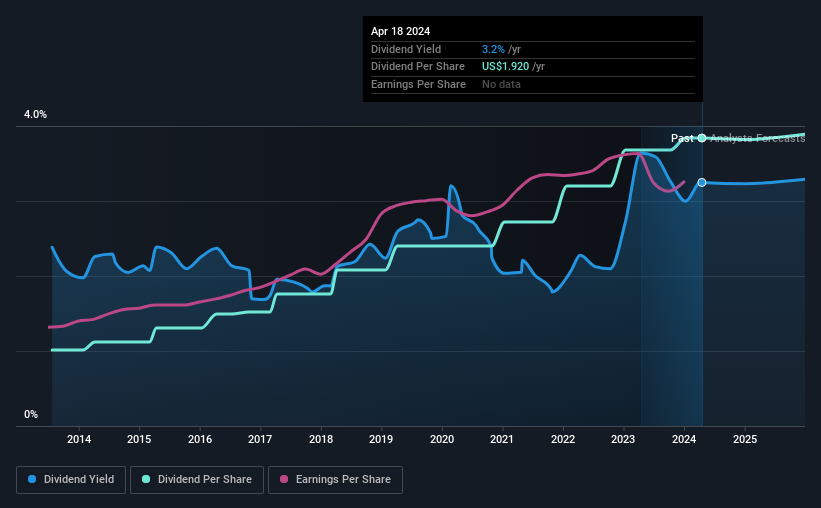Lakeland Financial Corporation (NASDAQ:LKFN) Goes Ex-Dividend Soon
Readers hoping to buy Lakeland Financial Corporation (NASDAQ:LKFN) for its dividend will need to make their move shortly, as the stock is about to trade ex-dividend. The ex-dividend date occurs one day before the record date which is the day on which shareholders need to be on the company's books in order to receive a dividend. The ex-dividend date is an important date to be aware of as any purchase of the stock made on or after this date might mean a late settlement that doesn't show on the record date. In other words, investors can purchase Lakeland Financial's shares before the 24th of April in order to be eligible for the dividend, which will be paid on the 6th of May.
The company's next dividend payment will be US$0.48 per share, on the back of last year when the company paid a total of US$1.92 to shareholders. Looking at the last 12 months of distributions, Lakeland Financial has a trailing yield of approximately 3.2% on its current stock price of US$59.12. Dividends are an important source of income to many shareholders, but the health of the business is crucial to maintaining those dividends. So we need to check whether the dividend payments are covered, and if earnings are growing.
Check out our latest analysis for Lakeland Financial
Dividends are typically paid out of company income, so if a company pays out more than it earned, its dividend is usually at a higher risk of being cut. Lakeland Financial paid out more than half (51%) of its earnings last year, which is a regular payout ratio for most companies.
Generally speaking, the lower a company's payout ratios, the more resilient its dividend usually is.
Click here to see the company's payout ratio, plus analyst estimates of its future dividends.
Have Earnings And Dividends Been Growing?
Companies with consistently growing earnings per share generally make the best dividend stocks, as they usually find it easier to grow dividends per share. Investors love dividends, so if earnings fall and the dividend is reduced, expect a stock to be sold off heavily at the same time. This is why it's a relief to see Lakeland Financial earnings per share are up 3.0% per annum over the last five years.
Many investors will assess a company's dividend performance by evaluating how much the dividend payments have changed over time. In the last 10 years, Lakeland Financial has lifted its dividend by approximately 14% a year on average. We're glad to see dividends rising alongside earnings over a number of years, which may be a sign the company intends to share the growth with shareholders.
The Bottom Line
From a dividend perspective, should investors buy or avoid Lakeland Financial? Earnings per share have been growing at a reasonable rate, and the company is paying out a bit over half its earnings as dividends. At best we would put it on a watch-list to see if business conditions improve, as it doesn't look like a clear opportunity right now.
However if you're still interested in Lakeland Financial as a potential investment, you should definitely consider some of the risks involved with Lakeland Financial. To help with this, we've discovered 2 warning signs for Lakeland Financial (1 is significant!) that you ought to be aware of before buying the shares.
Generally, we wouldn't recommend just buying the first dividend stock you see. Here's a curated list of interesting stocks that are strong dividend payers.
Have feedback on this article? Concerned about the content? Get in touch with us directly. Alternatively, email editorial-team (at) simplywallst.com.
This article by Simply Wall St is general in nature. We provide commentary based on historical data and analyst forecasts only using an unbiased methodology and our articles are not intended to be financial advice. It does not constitute a recommendation to buy or sell any stock, and does not take account of your objectives, or your financial situation. We aim to bring you long-term focused analysis driven by fundamental data. Note that our analysis may not factor in the latest price-sensitive company announcements or qualitative material. Simply Wall St has no position in any stocks mentioned.

 Yahoo Finance
Yahoo Finance 
